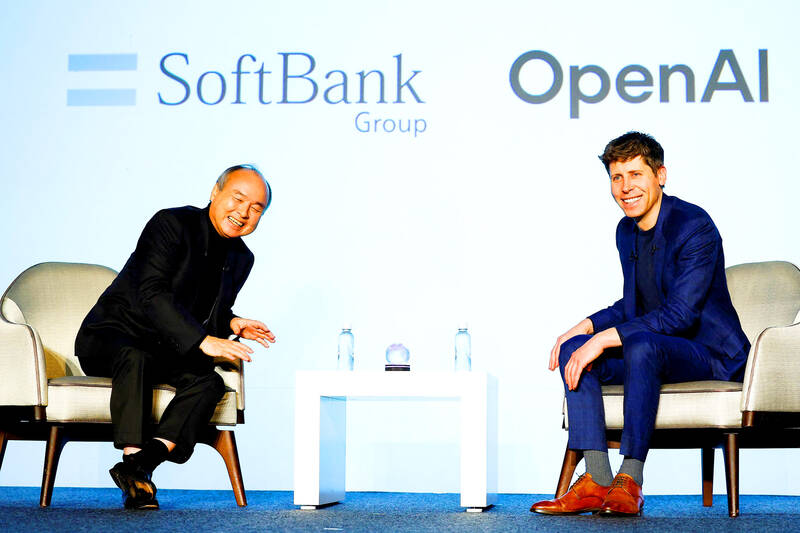Softbank Group chief executive officer Masayoshi Son plans to borrow US$16 billion to invest in artificial intelligence (AI), the company’s executives told banks last week, The Information tech news Web site reported on Saturday, citing people familiar with the matter.
The Japanese technology investor might borrow another US$8 billion early next year, the report added.
It was reported in January that Softbank is in talks to invest up to US$25 billion in ChatGPT owner OpenAI, as the Japanese conglomerate continues to expand into the sector.

Photo: Reuters
Softbank’s investment would be on top of the US$15 billion it has already committed to Stargate, a private sector investment of up to US$500 billion for AI infrastructure — funded by Softbank, OpenAI and Oracle Corp — to help the US stay ahead of China and other rivals in the global AI race.
The Information — a tech industry-focused publication headquartered in San Francisco — previously reported that Softbank was planning to invest a total of US$40 billion into Stargate and OpenAI, and had begun talks to borrow up to US$18.5 billion in financing, backed by its publicly-listed assets.
Separately, Arm Holdings PLC is set to sign a pact next week to establish a base in Malaysia, the Malaysian news agency Bernama reported on Friday, citing Malaysian Prime Minister Anwar Ibrahim.
Anwar had a discussion with Arm chief executive officer Rene Haas on Friday, he told reporters in Putrajaya, Malaysia. Son also took part in the meeting, he said.
The Southeast Asian nation last year pledged at least 25 billion ringgit (US$5.6 billion) to support its semiconductor industry, seeking to increase its role as tensions between the US and China shake up global supply chains.
Malaysia’s semiconductor industry aims to double its exports to 1.2 trillion ringgit by 2030 to cement its position as the sixth-largest chip exporter in the world.
Additional reporting by Bloomberg

IN THE AIR: While most companies said they were committed to North American operations, some added that production and costs would depend on the outcome of a US trade probe Leading local contract electronics makers Wistron Corp (緯創), Quanta Computer Inc (廣達), Inventec Corp (英業達) and Compal Electronics Inc (仁寶) are to maintain their North American expansion plans, despite Washington’s 20 percent tariff on Taiwanese goods. Wistron said it has long maintained a presence in the US, while distributing production across Taiwan, North America, Southeast Asia and Europe. The company is in talks with customers to align capacity with their site preferences, a company official told the Taipei Times by telephone on Friday. The company is still in talks with clients over who would bear the tariff costs, with the outcome pending further

A proposed 100 percent tariff on chip imports announced by US President Donald Trump could shift more of Taiwan’s semiconductor production overseas, a Taiwan Institute of Economic Research (TIER) researcher said yesterday. Trump’s tariff policy will accelerate the global semiconductor industry’s pace to establish roots in the US, leading to higher supply chain costs and ultimately raising prices of consumer electronics and creating uncertainty for future market demand, Arisa Liu (劉佩真) at the institute’s Taiwan Industry Economics Database said in a telephone interview. Trump’s move signals his intention to "restore the glory of the US semiconductor industry," Liu noted, saying that

NEGOTIATIONS: Semiconductors play an outsized role in Taiwan’s industrial and economic development and are a major driver of the Taiwan-US trade imbalance With US President Donald Trump threatening to impose tariffs on semiconductors, Taiwan is expected to face a significant challenge, as information and communications technology (ICT) products account for more than 70 percent of its exports to the US, Chung-Hua Institution for Economic Research (CIER, 中華經濟研究院) president Lien Hsien-ming (連賢明) said on Friday. Compared with other countries, semiconductors play a disproportionately large role in Taiwan’s industrial and economic development, Lien said. As the sixth-largest contributor to the US trade deficit, Taiwan recorded a US$73.9 billion trade surplus with the US last year — up from US$47.8 billion in 2023 — driven by strong

STILL UNCLEAR: Several aspects of the policy still need to be clarified, such as whether the exemptions would expand to related products, PwC Taiwan warned The TAIEX surged yesterday, led by gains in Taiwan Semiconductor Manufacturing Co (TSMC, 台積電), after US President Donald Trump announced a sweeping 100 percent tariff on imported semiconductors — while exempting companies operating or building plants in the US, which includes TSMC. The benchmark index jumped 556.41 points, or 2.37 percent, to close at 24,003.77, breaching the 24,000-point level and hitting its highest close this year, Taiwan Stock Exchange (TWSE) data showed. TSMC rose NT$55, or 4.89 percent, to close at a record NT$1,180, as the company is already investing heavily in a multibillion-dollar plant in Arizona that led investors to assume